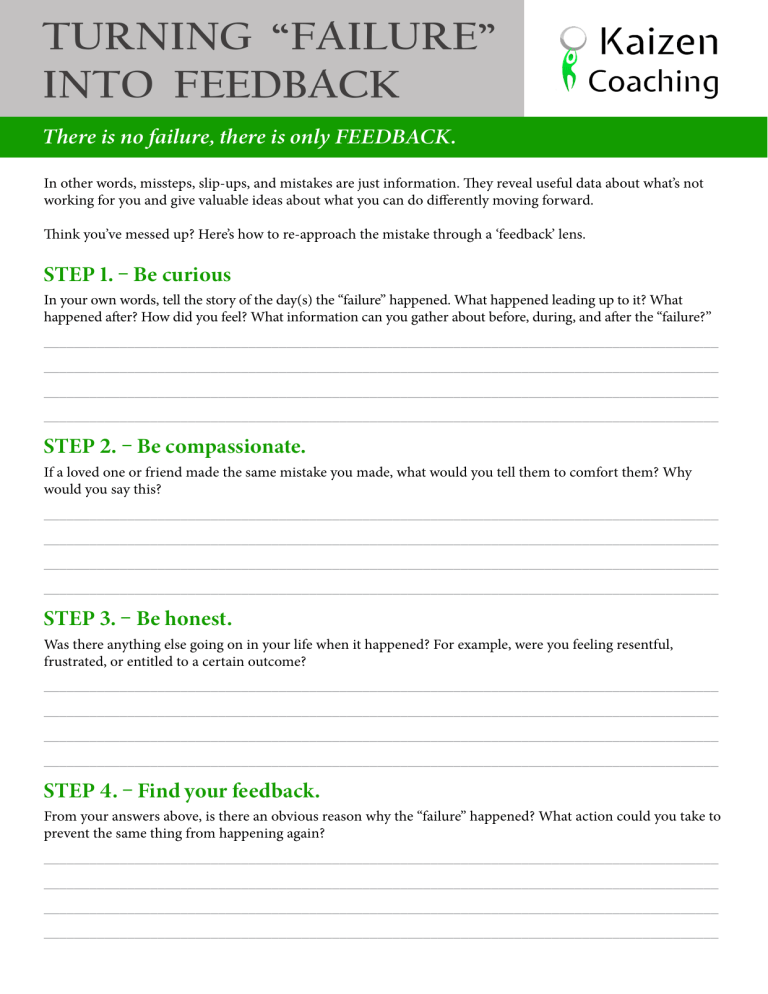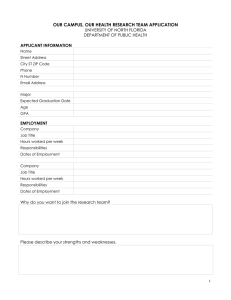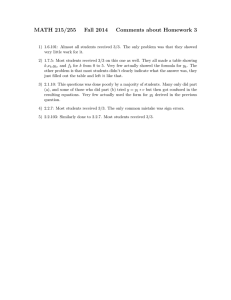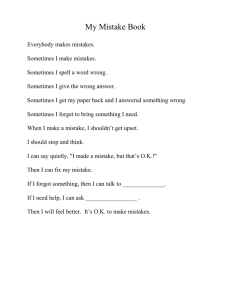
TURNING “FAILURE” INTO FEEDBACK There is no failure, there is only FEEDBACK. In other words, missteps, slip-ups, and mistakes are just information. They reveal useful data about what’s not working for you and give valuable ideas about what you can do differently moving forward. Think you’ve messed up? Here’s how to re-approach the mistake through a ‘feedback’ lens. STEP 1. – Be curious In your own words, tell the story of the day(s) the “failure” happened. What happened leading up to it? What happened after? How did you feel? What information can you gather about before, during, and after the “failure?” _________________________________________________________________________________________ _________________________________________________________________________________________ _________________________________________________________________________________________ _________________________________________________________________________________________ STEP 2. – Be compassionate. If a loved one or friend made the same mistake you made, what would you tell them to comfort them? Why would you say this? _________________________________________________________________________________________ _________________________________________________________________________________________ _________________________________________________________________________________________ _________________________________________________________________________________________ STEP 3. – Be honest. Was there anything else going on in your life when it happened? For example, were you feeling resentful, frustrated, or entitled to a certain outcome? _________________________________________________________________________________________ _________________________________________________________________________________________ _________________________________________________________________________________________ _________________________________________________________________________________________ STEP 4. – Find your feedback. From your answers above, is there an obvious reason why the “failure” happened? What action could you take to prevent the same thing from happening again? _________________________________________________________________________________________ _________________________________________________________________________________________ _________________________________________________________________________________________ _________________________________________________________________________________________ TURNING “FAILURE” INTO FEEDBACK STEP 5. – Evaluate your environment and support system. There are two big reasons people fail at making healthy changes: a problem with their environment, or a lack of social support. Environmental factors are things that have to do with our surroundings. For example: keeping processed and highly palatable food in the house, not having healthy foods readily available, and visiting restaurants or bars where it’s difficult for your to make healthy choices. A lack of social support can look like friends, partners, and family members who aren’t on-board with your challenge, not having a like-minded community, and/or co-workers who roll their eyes at your meal-prepped lunches. With this in mind, once of the best ways to prevent further “failure” is to plan and prepare. To help you avoid these future roadblocks, fill in the following questions. Question 1. What environmental factors can you identify that played a role in your “failure?” _______________________________________________________________________________________ _______________________________________________________________________________________ _______________________________________________________________________________________ _______________________________________________________________________________________ Question 2. What are some ways you could change your environment to avoid these factors? _______________________________________________________________________________________ _______________________________________________________________________________________ _______________________________________________________________________________________ _______________________________________________________________________________________ Question 3. What support system might have been lacking when your failure happened? (Hint: The goal here is not to blame, but to observe.) _______________________________________________________________________________________ _______________________________________________________________________________________ _______________________________________________________________________________________ _______________________________________________________________________________________ Question 4. What actions can you take to strengthen that (or another) support system? _______________________________________________________________________________________ _______________________________________________________________________________________ _______________________________________________________________________________________ _______________________________________________________________________________________ NEED MORE HELP? Find us on www.kaizencoaching.jp or on Instagram @kaizen.coaching






